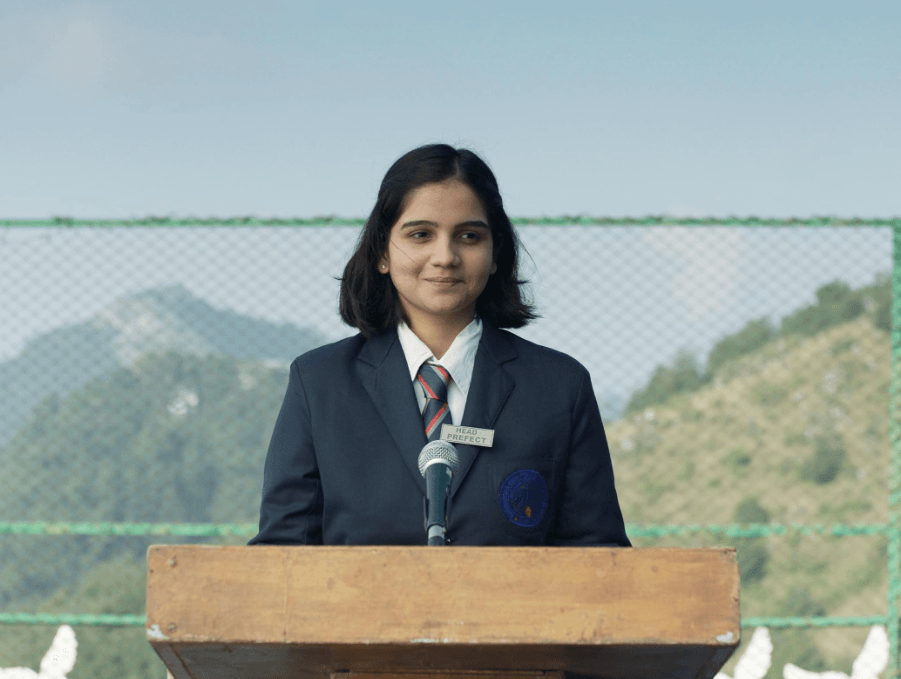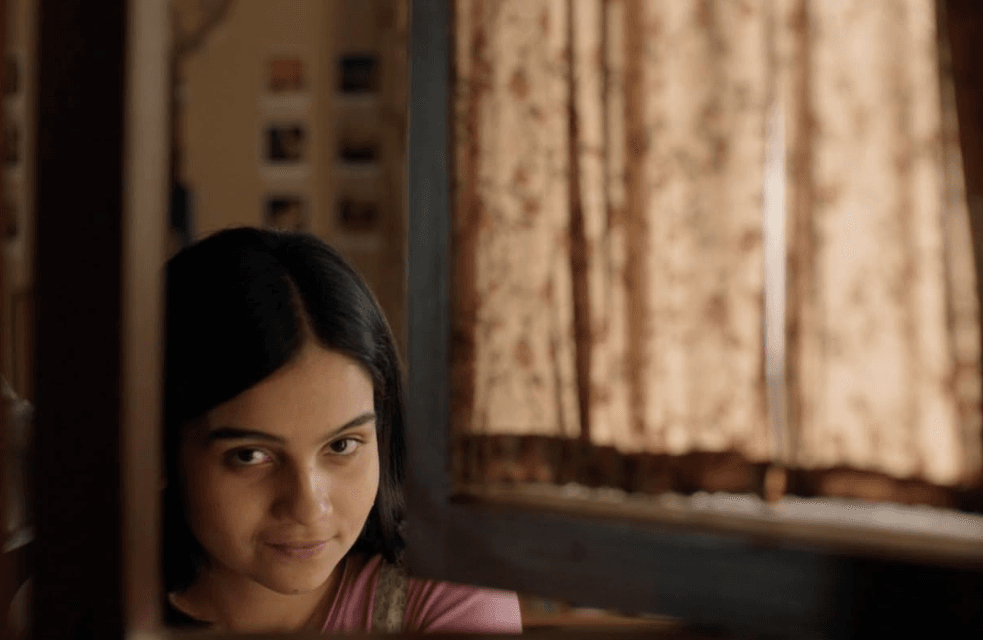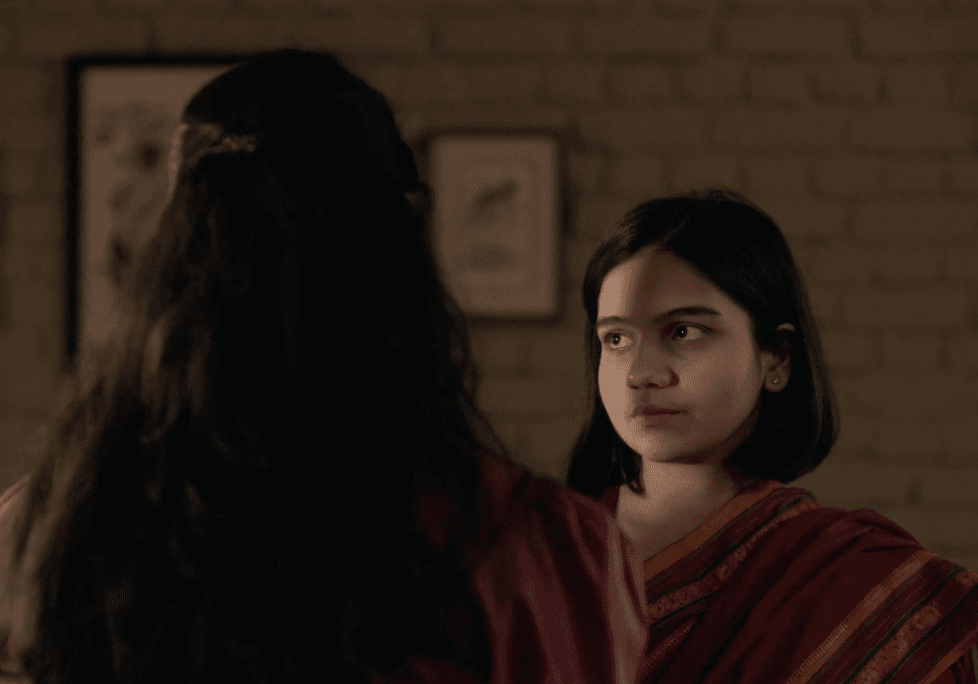Indian-born Shuchi Talati’s debut feature is a well-crafted, intricate story of the human complexities of an 18-year-old girl, Mira, stuck in a strictly boarding school morality where feminine freedom is rarely acknowledged and never the feminist freedom.
With power comes responsibility
Mira Kishore (Preeti Panigrahi), an 18-year-old studying 12th grade in a strict boarding school, was made the head prefect of the school, a role model for all the students. She is the ‘good girl,’ or rather, the imagery of goodness was drawn around her, and she was forced to tailor-fit into that personality. As is often the case, the responsibility of ‘respect,’ is crushed into the throats of women by society. Mira pledges to “protect the age-old Indian culture.”

The pressure to be a traditional ‘good girl‘ is immense on her. Girls will be Girls is the story of what would happen to her ‘respect and responsibility’ the moment the zealousness of her age starts to burst out as she befriends her charming love interest, Srinivas (Kesav Binoy Kiron).
During the introduction scene in a pledge ground with beautiful foothills of the Himalayas as a background, the principal introduces Mira by saying that she is the first female to be the head prefect from a girls hostel. As we may be watching this from 2024, we might wonder at what archaic era this is happening? The story of Mira happens in an era of radios and internet cafes—where the knowledge of sex is not as abundantly accessible as that is right now. The production designer Avyakta Kapur and Shaahid Amir’s costume designs are not blatantly archaic. Although the funky dressing style of Anila gives you a hint of the past. The aspect of time in Girls Will Be Girls is something at a merely contextual level.
The curious zeal and the subtle jealous
The aspect of time is again reinforced by the cinematographer Jih-E Peng by having the quality aesthetic frames that don’t focus much on time or objects that indicate the specific timeframe—the usual overused cinematic technique. Jih-E Peng frames too many closeups and point-of-view shots. The camera-in-the-face adds much intimate connection with the characters. But not in a weird way. And the POV shots are as perfect as to manufacture a critical conversation about the motives of characters in your head.

The zealousness of Mira doesn’t stop at befriending Sri lovingly. She desperately wants to experience everything she can, including the sex. She was shocked to know that Sri already knows how to do it right. There is a slight discomfort in her face. She takes up the challenge of having sex as a project that needs to be finished. On Sri’s birthday, she coldly demands the sex, and later someday she refuses to go down on him. There is the rebellious affirmative young—almost nearly underaged—for you, commanding her own sexual choices.
When Srinivas leaves Mira alone to study after he ejaculated in his pants after an intense kiss; or when Sri takes a siesta beside Anila; or when Anila demands that Srinivas needs to sleep in her bed, the unsaid thoughts of insecurity and attention-seeking mentality of Mira don’t stop in your head as you see the frames of Anila and Srivas from the POV of Mira. To make a film that doesn’t only speak to you but also makes you have a conversation with your own headspace is a marvel achieved through the minimal dialogues written by Talati and stitched together by dialogue editors Matthieu Choux and Colin Favre-Bulle.
Men will be men and Girls Will Be Girls
Men will be men is an extremely successful surrogate ad campaign run by Seagram’s Imperial Blue. It is so popular that you might have already started to hum the tune of the ad, at least in your head. The ad campaign was accused of normalising the male gaze in public spaces, reinforcing the stereotype of masculine males as oglers filled with lust and only concerned about the ‘standards‘ of beauty. Titling this feature as Girls Will Be Girls is not a coincidence. It’s a reply to pop culture with an affirmative stance: Girls should be girls.

The creepy young boys of the school take pictures of skirt-worn girls. When Head Prefect Mira confronts this issue with Ms. Bansal (Devika Shahani), she calmly dismisses it by blaming the girls for wearing short skirts. Giving more attention to the creeps would harm the girls in return, she says. (Later they get suspended.) The climax scene where her power of being a head prefect becomes nullified on the day of teachers day, the day when all the senior 12th standard students become the teachers of the schools and the head prefect becomes the principal. So, that day, her classmates—same suspended boys—are also given almost an equal power status as hers. The boys see Mira near the terrace door—where Mira and Sri might have planned to have sex. The boys begin cat-calling her and hounding her. The visual of a bunch of men hounding behind a saree-clad young girl is so terrifying that the instant imagery that popped inside the head was the climax of Lijo Jose Pellissery’s Jallikattu.
The boys complain to Ms. Bansal. Yet, despite all the almost-true allegations, Anila stands firm. She doesn’t say a word to her daughter. She is baffled at the way heckling boys were not even summoned, but her daughter was being morally questioned. This nuanced portrayal of the privileges of men/boys to get away in the matters of safe-guarding the ‘age-old Indian culture‘ (even if the perpetrators are the men) is a statement that speaks of the culture that we have fostered that keeps the women on the pedestal of blame.
When the film begins, we are all with Mira. She being rebellious and curious and voicing her feministic strength makes you more rooted to her. As the story progresses, almost like a thriller, we begin to acknowledge how complicated the relationship dynamics are. As Girls Will Be Girls, begins to end, you are with Anila. You understand the rightful reasons of how liberal even her conservativeness is, that is not really in restricting Mira’s feminine freedom but only concerned with the care of a loving mother.
Girls Will Be Girls is now streaming on Amazon Prime Video.
About the author(s)
Azdhan (He/Him) is a full-time film critic freelancing for Feminism In India. If he is not reading or writing, he will just be zoning-out– even if there is no window– always thinking of writing his next novel to adapt it into a screenplay. The backend process of trying to build something that can solve urban loneliness is also always on his mind.





